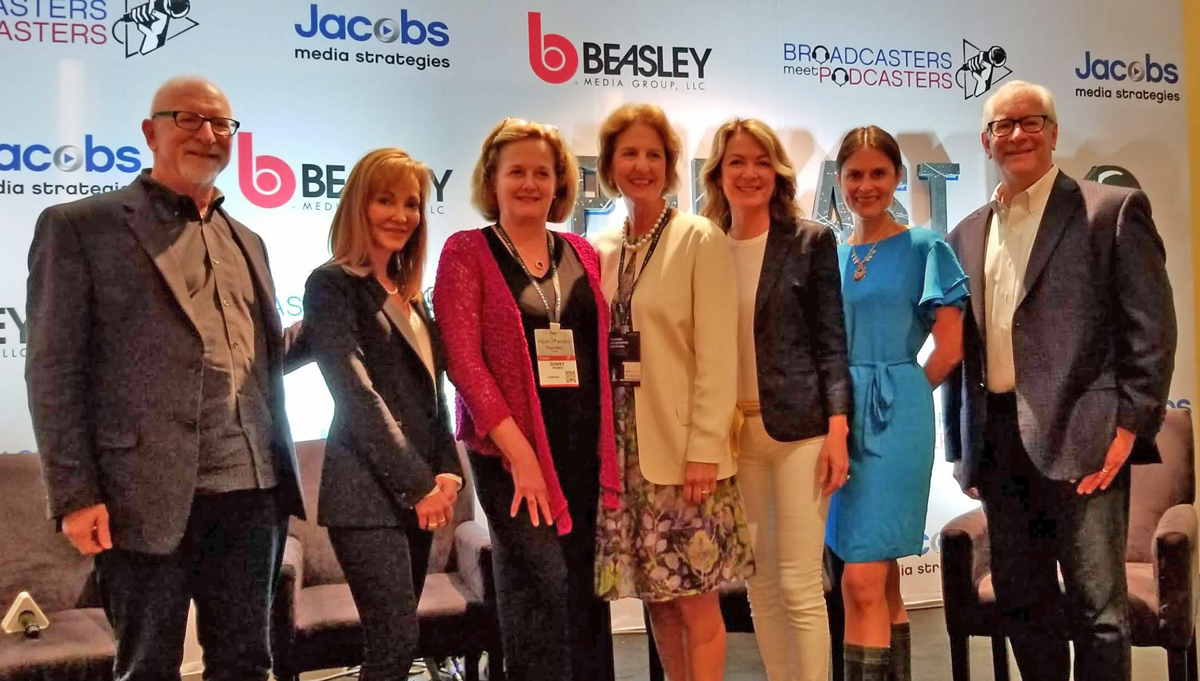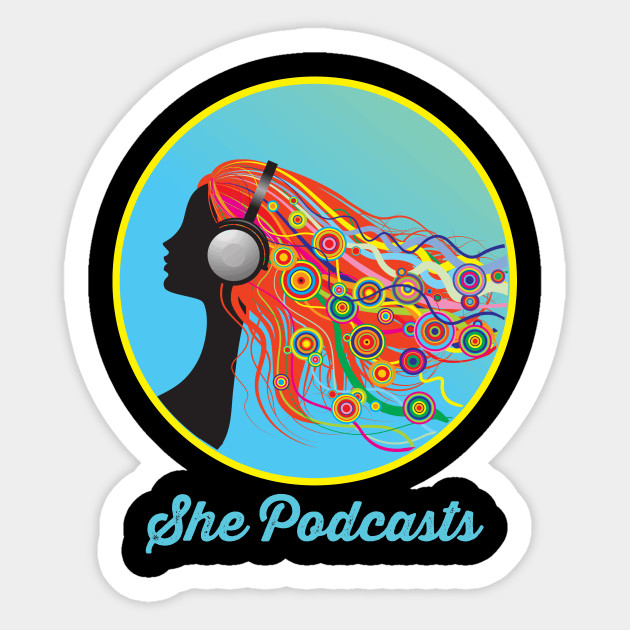
Elsie Escobar has been involved with the podcasting industry for over a decade. She’s an inductee to the Academy of Podcasters Hall of Fame, she co-runs She Podcasts, a podcasting community for women that has over 10,000 members, and she is the Community Manager for Libsyn, the podcast publishing platform.
Last month, she hosted our roundtable discussion with radio CEOs as part of the Broadcasters Meet Podcasters track at the Podcast Movement conference. That panel included Caroline Beasley of Beasley Media, Suzanne Grimes of Westwood One and Cumulus, Ginny Morris of Hubbard Radio, and Julie Talbott of Premiere Networks – great broadcasters excited about the podcasting space.
When we put together this Broadcasters Meet Podcasters sessions, one of our original goals was to expose radio people to the podcasting culture. Elsie embodies that spirit, that energy, and that sense of purpose. – Seth Resler
I feel a sense of ease when sharing podcasting insight, education, and analysis with other podcasters or those that are choosing to podcast.
Sharing about podcasting with radio has felt a bit more challenging.
Why?
Because podcasting is a bit over a decade old. Radio? Um, a lot older than that.
One of the most significant mindset hurdles to overcome in both the podcasting and the radio industries is in assigning power, credibility, and legitimacy to the way things have always been.
And so to navigate a change in narrative, I offer these 5 bits of insights that stem from the question: How are we offering content that has an impact, creates understanding, and isn’t merely replicating existing media and cultural dynamics?
1. Podcasters are driven by core values and mission.
 I’d be remiss if I didn’t admit that podcasters want fame and fortune, because we do. But we want fame and fortune our way.
I’d be remiss if I didn’t admit that podcasters want fame and fortune, because we do. But we want fame and fortune our way.
Podcasters podcast because we must.
We podcast because we are first and foremost looking for a new way of doing things.
We love the freedom.
We love the ability to create a show based on what we are missing and what we want vs. expectations and what has worked in the past.
Podcasters that are intensely driven by mission and guided by values consistently end up with long-running successful shows that break all molds. Here are some varied, examples of long-running podcasts that lead with their mission:
- Saturday Morning Media + more: from podcaster to professional puppeteer and still podcasting
- A Nun’s Life Ministry: nuns that have been serving their community via podcast for over a decade.
- Adoptees On: speaking to adoptees like only an adoptee can – no sugarcoating here
- Diabetes Connection: education and advocacy for those diagnosed with type 1 diabetes
- Dates & Mates: 6 seasons of dating news, celebrity relationship headlines, and Q & A
- Packers Fan Podcast: 8 seasons covering, well, The Green Bay Packers as only fans can
What the above have in common is they are still podcasting, they are still growing, and they are genuinely passionate about their topics.
What they don’t have in common is a much longer list.
- They are all different lengths.
- They have different audiences.
- They may or may not have segments.
- They may or may not do interviews.
- They follow the format that works for them, and more.
The choices they make about their shows are based on the culture they have created, what best fits their values, and what best supports the missions of their podcasts.
2. Shifting the culture of listening is imperative.
Podcasters put their listeners front and center.
And we know there is no one way to listen to a podcast.
We make sure we meet our listeners where they are.
Shifting a listener’s behavior, especially when they are used to doing things their way, is a significant challenge.
The freedom of RSS allows for podcast listening not only to continue to reach an audience via tried and true podcast directories like Apple Podcasts, but also expand into the newer players like Spotify and Google Podcasts and to all the incredible third party podcast listening apps that support whatever smartphone OS is preferred by our listeners.
Podcasters know that making podcasts easily accessible regardless of OS, app, new hardware, services like Alexa or the connected car, serves to build a greater audience.
Whatever we can do to maintain that freedom continues to be a key reason why our listeners keep listening and why podcasting continues to gain ear time in people’s daily lives.
3. The silver bullet in growing podcasting is education.
The least amount of focus for most podcasters is in educating potential non- podcast listeners about how to consume our content. We need to do better.
There is an expectation as podcasters that when people come into contact with our content, they will know exactly what to do and how to listen.
Most of us podcasters do not explain what our podcast is about nor how to get it. We take it for granted that consuming audio content is ‘a “thing.”
We know how to speak to our current audience and how to create and grow our community, but we drop the ball on taking the responsibility to teach about podcasting outside current podcast listeners.
We need to illustrate to possible listeners why podcast listening is so awesome vs or in addition to listening to other things (audiobooks, radio, music, etc.).
We need to be our own number one advocate.
As much as the term podcasting and podcasts have started to be part of mainstream culture, what these terms are remain a bit nebulous for the general public.
It’s time to take responsibility and educate.
4. Representation matters.
An important and influential differentiator in podcasting vs. other media is that if you have a voice and you have something to say you can podcast.
RSS is an open protocol. It is decentralized.
Even if a big player like Apple Podcasts that facilitates distribution of RSS via a directory disappeared, with RSS, your voice, your message is still there.
The vast majority of podcast apps allow for manual addition of RSS feeds, and there are still influential RSS feed readers that support podcast subscriptions.
Podcasting is the voice of the people. The disenfranchised, those “on the fringe,” those that aren’t generally represented in mainstream media are represented in podcasting.
Diversity in content, race, age, sexuality, politics, religion, and language is the norm.
This type of inclusivity, without gatekeepers, drives innovation and true cultural evolution.
The next step is an accurate representation and highlighting of the current quality podcasts in mainstream coverage in media outlets to bring awareness to the tapestry of content.
Diverse content exists and has existed.
Unfortunately, features, coverage, and reporting on podcasting have not evolved to reflect the myriad of content that is available and is having an impact.

5. Trust in what you know and be willing to admit you don’t know everything.
Although there is data, proven monetization models, confirmed successful strategies, and evidential stats on promotional campaigns to create a viable and thriving podcast, there are quite a few podcasts out there that break all these practices.
As podcasters, we do our homework, lead with a mission, are willing to do far more work than we thought we had to, trust in the excellence of our work and recognize that there is a lot that we don’t know.
We begin to gain clarity around what we don’t know through direct engagement with our audience.
A distinct characteristic of podcasting is the immediacy and intimacy of the relationship between podcast creators and their audience.
The most vibrant and enduring podcasts are those that have grown together with their audiences, establishing a clear path to feedback, two-sided communication and experience of co-creation.
A podcast is a living breathing thing. It ebbs and flows as the podcaster engages in the creation and pointed development of the content, consistently, for months, with our audience.
Podcasters are primarily a community driven by collective core values of freedom and decentralization.
We love to collaborate, and innovate while creating contemporary and compelling content.
Our great hope is that as radio steps into the culture of podcasting it brings its long-standing experience and history, and yet stays open to what has made podcasting so evocative – breaking molds, taking risks, and leading with freedom and inclusion.
- A Simple Digital Treat to Thank Your Radio Listeners This Thanksgiving - November 13, 2023
- Interview Questions When Hiring Your Radio Station’s Next Digital Marketing Manager - November 6, 2023
- A Radio Conversation with ChatGPT: Part 2 – Promotions - October 30, 2023





Leave a Reply